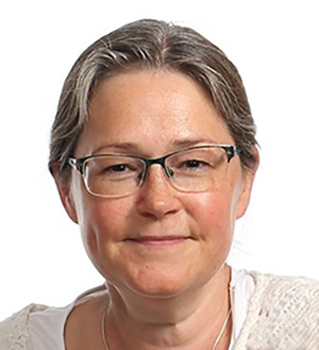Professor's portrait: Elisabeth Uhlemann

Elisabeth Uhlemann is one of the professors to be installed at the Academic Ceremony on 7 October 2022.
Elisabeth Uhlemann, Professor in Data Communications, School of Innovation, Design and Engineering, Division of Networked and Embedded Systems.
Please tell us briefly about your academic career – what decisions have brought you to where you are today?
I was so tired of studying during upper secondary school so I decided to add the fourth year to my technical upper secondary education, which was possible in those days, to try to get some sort of vocational education and training, as I didn’t want to conduct further studies. After a few years of working in industry, I noticed that those who had a higher education were given more interesting work tasks, so I reluctantly started a three-year engineering programme at Halmstad University. Student life, and to some extent also university studies, sparked an interest which made me want to learn more, so I continued on to a master’s program. My Master's education in Computer Systems Engineering and in particular the degree project was so much fun, so I enrolled in doctoral studies to be able to devote more time to that specific area. I, who thought I would never study again, still haven't left school!
In what area do you conduct research?
I conduct research in communication systems. The area relates to machines, vehicles, computers, robots and various smart things being able to generate and receive information, to be remotely controlled or to cooperate in a safe and secure way. They do this with the help of a good communication system. By ensuring that the right data is in the right place at the right time so that safety-critical decisions can be made, is an exciting research domain which also helps to solve many important societal challenges. As more and more things become connected, the demands on being able to access and share data in a safe and secure way in and between different systems continues to increase.
How would you describe your research environment at MDU?
There is a distinct focus on collaboration and coproduction. The societal challenges often come directly from our industrial partners with whom we work together both long-term and within projects, and in fact both within research and education. Furthermore, collaboration exists in the research environment between fundamental research and applied research as well as between different disciplines. Those who conduct research on hardware are close to those who research software, so together with those of us who carry out research within communication, we cover all parts of an embedded computer system. We are good at fundamental research; however we are excellent at applying and converting fundamental research into real-life application.
What is the driving force in your research?
First and foremost, curiosity. What happens if you do that? Why doesn’t this work? I'm also passionate about aiming to make the world a better place. Good communication systems help to improve safety in healthcare, optimize our energy systems, create infrastructure with better resilience, increase productivity in industry and enable safer transport systems.
Which research domains are particularly important for you?
Those which contribute to a better climate. Right now, my main focus is on connected intelligent transport systems. By driving close together, connected vehicles can form a platoon, which can drastically reduce emissions as the trucks experience less air drag . Together with my other colleagues' research on efficient batteries, communication systems can lead to fully electrified vehicle fleets. In addition, the traffic accidents which involved autonomous vehicles could have been avoided if they had used wireless communication and not just smart AI.
How do you feel about becoming a Professor given that MDU has recently become an official University?
We have been conducting research of a high international standard for a long time now, so I would have felt just as proud to become a Professor despite the change of university status. However, more people may become aware of our university now, which makes it even more important for us to continue to conduct high quality research and education. This is a challenge that I am really looking forward to taking on – together with our strategic collaboration partners.
What's the best part about conducting research at MDU?
That there’s a foundation built on collaboration between academia and industry as well as between the various disciplines with special focus on important societal challenges. We can and want to make a difference!
